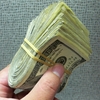Jim makes the following conjecture: other than 1, there are no numbers less than 100 that are perfect squares and perfect cubes. what is a counterexample that proves his conjecture false?
Answers (1)
Know the Answer?
Not Sure About the Answer?
Find an answer to your question 👍 “Jim makes the following conjecture: other than 1, there are no numbers less than 100 that are perfect squares and perfect cubes. what is a ...” in 📗 Mathematics if the answers seem to be not correct or there’s no answer. Try a smart search to find answers to similar questions.
Search for Other Answers
You Might be Interested in
What if I were to add four odd numbers together is the sum always sometime even or never even
Answers (2)
What is the common difference of the arithmetic sequence on which the series is based? -3 4 6 9
Answers (1)
Write each expression in its radical form. 6 1/5 6 7/5 6 1/6 7 1/2 7 5/2 6 9/2
Answers (1)
How can you generate x + 3y + 5 from the expression x + y + 4 + 2y + 1?
Answers (1)
How many solutions does this system of equations have? exactly one none infinitely many exactly two
Answers (1)
New Questions in Mathematics
What's two plus two equal to?
Answers (2)
Last month the pet store sold 48 birds, 58 fish, and 17 hamsters. The average cost of each pet was $9.25. How many more fish than birds did the store sell? A. Need to know the number of fish and birds sold. B.
Answers (1)
8686 rounded to the nearest non zero
Answers (2)
Damon plans to buy a snowboard that cost $160. Damon has $40. He will save $20 each week until he has enough to buy the snowboard. Let x represent the number of weeks it will take for Damon to save the money he needs
Answers (2)
Using the expression below, choose the correct answers for the new balance and amount of interest earned in the following compound interest problem. P (1 + r) n $1,100 at 8%, for 15 years, compounded annually. Total Amount = $ Interest Amount = $
Answers (1)

